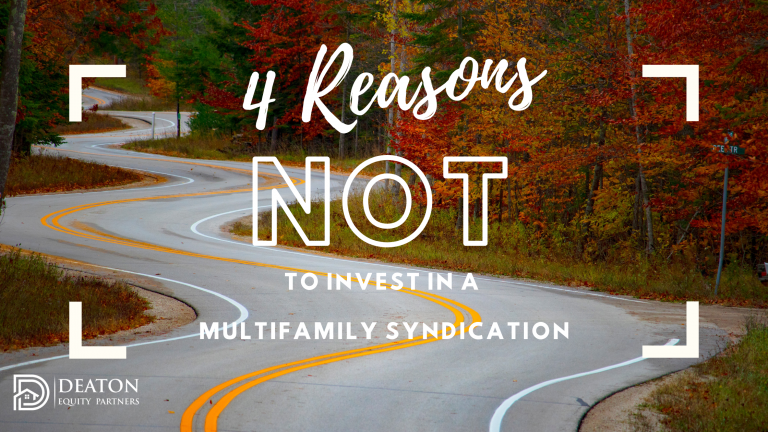4 Reasons Why NOT to Invest
– In a Real Estate Syndication –
If you’ve spent any time with us or visiting our website, you’re familiar with our perspective on real estate syndications.
WE THINK THEY ARE AWESOME!!!
We believe people should be interested and trying to invest in them, and we can’t wait to continue to share about them so that more people have the opportunity to learn about these types of passive investments. They have literally been life-changing for us.
However,
…we also know that real estate investments, for many people, are a BIG investment and are, as such, not the perfect choice for everyone.
So without further ado, here are our top four reasons why someone should NOT invest in real estate syndications (no drumroll required 😊)
1) You Can’t Take Your Money Out At Will
Entering into a real estate syndication deal means you agree to the terms of the investment and projected hold time. Other than a few exceptional cases, your investment capital (the money you invested) is illiquid (not easily withdrawn) for the duration of the deal until the asset is sold. Now each business plan is unique and it is expected that you will receive regular cash distributions, as well as possible equity payouts during the investment. Those returns however depend on the business investment operations and should not be counted upon.
So, if you’re passively investing in a real estate syndication deal and the hold time is 5 years, then you should plan to leave your money invested for the full 5 years, or possibly longer if market conditions change.
Other investments like stocks and mutual funds are much more flexible, and oftentimes you can decide to sell and have your money back within minutes. In contrast, real estate syndications do not allow you to make unplanned withdrawals at will.
Upon initiating or entering a real estate syndication deal, investors must sign the Private Placement Memorandum (PPM). This document spells out the hold time, liquidity, and other details of the investment. If there’s anything about the idea of investing at least $50,000 and not having access to it for 5 years that makes you uneasy, turn around now.
2) You Have To Invest A LOT of Money
The minimum investment on our real estate syndication deals is typically $50,000 (and sometimes $75,000), which is a LOT of money for most of us.
You could buy a car, pay for private school, or make major headway on a mortgage. There are many options on how such a large value of cash could be used. As you may have figured out though, we tend to believe wisely investing your money in cash-flowing assets is one of, if not the best way to grow your wealth over time and enjoy a wide degree of freedom!
Our advice? Don’t put $50,000 into a real estate syndication until you’re absolutely sure that THIS is how you want to use this money.
Want more of our advice? If you have $51,000 in your bank account, think long and hard before you invest $50,000 into a real estate syndication. If fact we meet with all of our potential investors upfront and this is exactly one of the reasons – to ensure they have the right knowledge about the in’s and out’s of multifamily syndication and assess whether it’s a good fit.
Since your investment won’t be available for several years, you’ll need to ensure you have enough saved in a separate emergency fund; have set aside other accessible savings for your short-term goals; and have access to cash to…well…cover life in general. Go with your gut on this one.
3) You Have to Learn A New Investment Method
Standard rental properties work much the same way as they do in the game of Monopoly. You stop by and assess a property, buy it, rent it out, and collect rent each month.
Investing passively in real estate syndications requires you to throw all of that out the window. Passive investors almost never set foot on the property, they don’t have a relationship with the lender or the management team, and they’ll never come into contact with tenants.
You will enter into the investment when the asset is already on its way to closing. Passive investing is called “passive investing” for a reason – because you’re not involved day-to-day and because you retain freedom of time throughout the process. Put your money to work for you and enjoy the fruits of someone else’s labor.
4) You Give Up Control
Another fundamental difference between passive investing and other investments is the level of control you have over the daily decisions made regarding the property, any renovations, and the tenants.
In personal real estate investments, you retain creative control over improvements, ensure (hopefully!) the screening of tenants, and determine the perfect time to sell the property.
Investing passively in real estate syndications removes all of these daily hassles and puts you in the passenger seat. This can be frustrating if you’ve previously enjoyed controlling every single aspect of an investment property. However, developing a level of trust in the sponsor team, in this case, is imperative.
If you don’t think you can handle allowing a team of industry professionals to make decisions for you, you might as well cross real estate syndications off your list now.

In Conclusion
Every syndicator and sponsorship team will shout from the rooftops about how great syndications are, and sure, they can be fabulous tools to grow wealth. But no investment vehicle is perfect and, certainly, no single investment style is perfect for everyone.
If any of the above top four reasons NOT to invest in a real estate syndication triggered you, maybe investing passively in real estate syndications isn’t your cup of tea. And that’s okay.
You should have (and do have) the power to choose what’s right for your situation, your family, and your financial goals; and you should absolutely exert that power to the fullest. Be honest with yourself and listen to your gut. You can also explore more and listen to the experience of other successful investors. It’s our goal to compile the best content on multifamily investing to help those that are interested, become ready.
Passive Income…for life!
And if you are interested in taking action, here are a few next steps down the path to financial freedom…
- EXPLORE more about the power of passive real estate investments in our section of other blogs and videos.
- SIGN UP for our newsletter for passive income-related content delivered right to your inbox
- JOIN our Passive Income Investors Group to gain access to multifamily investment opportunities and more behind the scenes content


